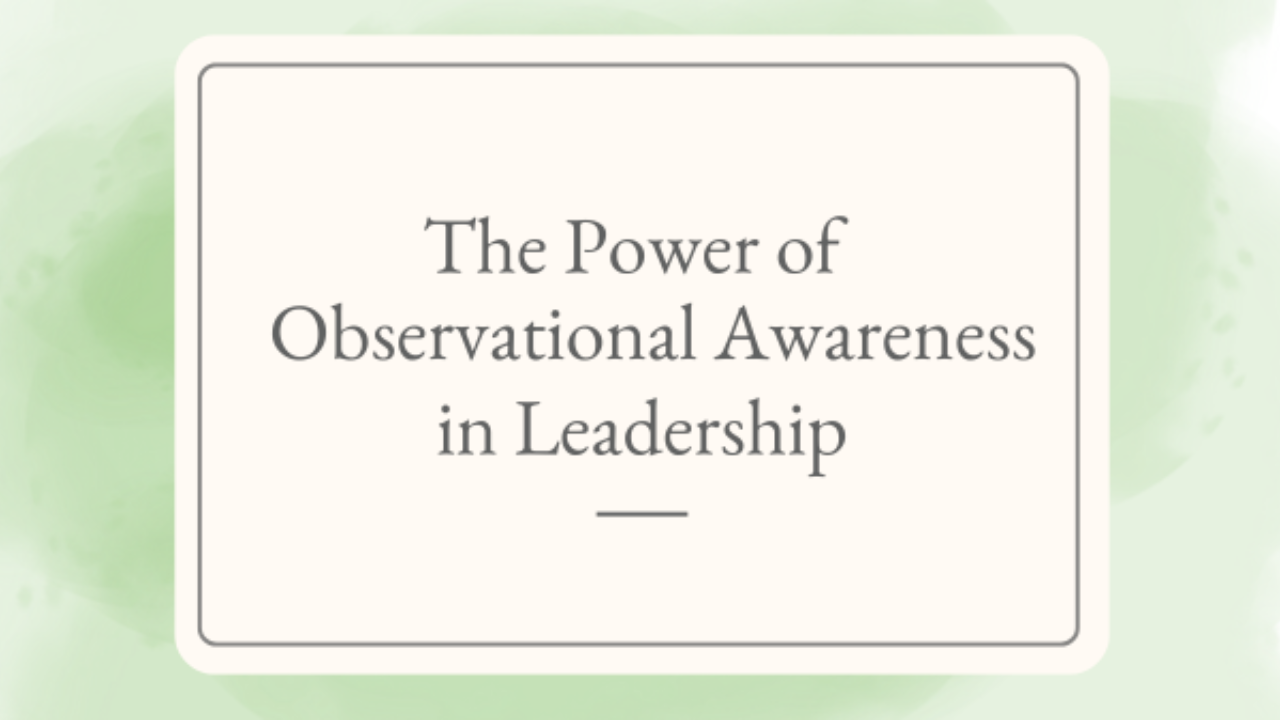The Power of Observational Awareness in Leadership

Human beings are naturally judgmental, but cultivating observational awareness can help us break free from automatic assumptions. Our brains are wired to scan the world, assess safety, and form impressions instantly. While this instinct serves a purpose, it also shapes perceptions in ways that may not always be beneficial—especially in leadership.
The Difference Between Observing and Judging
Understanding the distinction between observation and judgment is essential for effective leadership. Observations are based on facts or sensory information, stated neutrally. Judgments, on the other hand, involve interpretation, bias, and assumptions, which often lead to unfair or inaccurate conclusions. For instance, entering an office and thinking, "This place is messy!" is a judgment. The term "messy" carries a personal bias. Instead, stating, "There are stacks of papers on the desk and an open binder on the chair" is an observation. Observations remain neutral, whereas judgments add subjective meaning.
How Judging Impacts Leadership
When judgment replaces observation, relationships and interactions are affected in significant ways:
- Distorted Perceptions – Assumptions about others may not be accurate. A team member arriving late twice does not necessarily indicate laziness; there may be personal struggles at play.
- Defensiveness in Communication – A statement like, "You seem disengaged" may trigger a defensive response. Instead, saying, "In the last three meetings, you haven’t contributed to the discussion" invites conversation without placing blame.
- Erosion of Trust – People recognize when they are being judged, which creates barriers. Replacing judgment with observation fosters openness and trust.
Three Benefits of Focusing on Observations
Shifting from judgment to observation requires intentional effort, but the benefits make it worthwhile:
- Improved Communication – Stating facts rather than assumptions keeps discussions clear and productive.
- Stronger Relationships – Trust grows when individuals feel seen and heard without unfair labeling.
- Better Leadership Outcomes – Judgments can make others feel defensive, whereas observations create opportunities for meaningful change.
Practical Ways to Cultivate Observational Awareness
To cultivate observational awareness, integrate a few practical strategies into your daily routine. Start by pausing before reacting. Rather than immediately labeling a situation or person, take a moment to ask yourself, "What are the actual facts here?" This shift in mindset allows you to focus on the present moment without jumping to conclusions, create a more effective coaching relationship between leader and team member
Another effective practice is to reframe your language. For example, instead of saying, "They’re so disorganized," try saying, "I noticed their workspace has papers in multiple stacks." This approach helps you observe without judgment. Additionally, practicing active listening is key. Make a conscious effort to truly listen to what people are saying, avoiding the urge to immediately assign meaning or intent to their words. Lastly, seek clarification when necessary. If you find yourself making assumptions, take the time to ask questions like, "Can you tell me more about how you manage your workload?" This encourages deeper understanding and prevents misunderstandings.
Practice Exercise: Shifting from Judgment to Observation
Read the two examples below and practice identifying the judgmental statement and then rephrasing it as an observation. Use the phrase “I noticed that you…” to create a neutral, fact-based statement.
Example 1:
Situation:
A team member consistently arrives late to meetings.
-
Judgmental Sentence:
"You’re always late to meetings. It shows you don't care about the team." -
Observational Sentence:
____________________________________________
Example 2:
Situation:
A colleague submitted a report that was incomplete and had some errors.
-
Judgmental Sentence:
"You didn’t put enough effort into this report. It’s sloppy." -
Observational Sentence:
___________________________________________
Compare your answers to the possible answers at the end of the article. How were they different? Would you make any changes to your observational sentences?
The Challenge: Shifting from Judgment to Observation
Over the next week, take note of instances where judgment arises versus moments of observation. Consider how these thoughts shape interactions. Are meanings being assigned to situations, or are they being described neutrally? Reframing judgments into observations can lead to more constructive conversations and improved relationships.
Judgment is a natural human tendency, but with awareness and intentionality, we can lead with greater openness and understanding. Cultivating observational awareness in leadership is the key to fostering better communication, relationships, and outcomes. Reach out if you would like to receive 1:1 coaching or team training on this topic.
_________________________________________________________________________
Possible Answers for the Above Exercise:
Example 1:
-
Observational Sentence:
"I noticed that you arrived 10 minutes late to the meeting today."
Example 2:
- Observational Sentence:
"I noticed that the report was missing some key data and had a few errors in the analysis."


